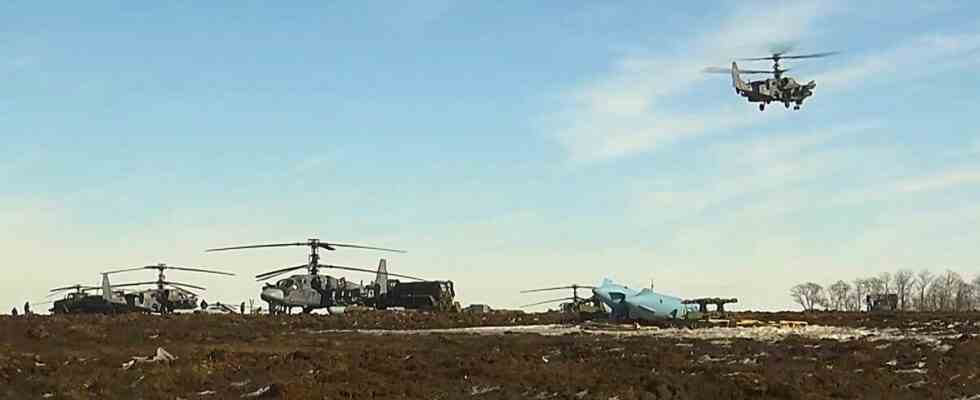For almost a month, Volodymyr Zelensky has been touring Western parliaments to try to convince people of the need to set up a no-fly zone over Ukraine. On Wednesday, he addressed the French parliament to plead his case, and he reiterated his positions at the extraordinary NATO summit on Thursday.
“To save people and our cities, Ukraine needs unrestricted military assistance,” Volodymyr Zelensky said in a video message to the heads of state of the Atlantic alliance. Just as Russia uses, without restriction, all its arsenal against us. Would the establishment of such a zone make third countries co-belligerent in this conflict, as Vladimir Putin asserted? We take stock.
What is a no-fly zone?
It is not a legal concept, but “a concept of fact”, explains Eric David, professor emeritus of public international law at the Free University of Brussels (ULB). Its implementation results in prohibiting the airspace to any aircraft that is not specifically authorized there. “For example, if an exclusion zone were established in Ukrainian airspace, that would mean that the State or States that would establish it give themselves the means to intercept aircraft that do not respect a zone of exclusion. exclusion and would force the planes in question to land, or shoot them down if these planes appear to be dangerous, ”he continues.
Such zones were already set up in the 1990s in Iraq to protect the Shiite minorities in the south and Kurdish minorities in the north from bombardments, in Bosnia in 1993 or in Libya in 2011. air exclusion is generally humanitarian, recalls Michael Schmitt, a researcher emeritus at the military academy at West Point, in the United States, in an article published on March 18. However, it can also be motivated, at least in part, by military considerations. »
Would its implementation be possible?
A legal framework allows the establishment of such a zone, according to several researchers. This could be authorized by the United Nations Security Council under Chapter VII of the United Nations Charter, which frames the right to wage war. The Security Council can thus authorize “any action by air, sea or land forces which may be necessary to maintain or restore peace and security” under Article 42. But the presence of Russia in the Security Council, and its right of veto, would prevent this implementation.
The other way would go through Article 51 of the United Nations Charter, which recognizes the “natural right of self-defence, individual or collective” of a State. This article “expressly authorizes ‘collective’ self-defense at the request, and according to the parameters established by a State”, supports Michael Schmitt, “regardless of whether the objective of the zone is humanitarian or support for Ukrainian forces”. Ukraine is within its rights in requesting help from foreign countries and granting them permission to fly in its airspace. By virtue of this logic, other countries can intervene to support the legitimate defense of a State.
What would be the military consequences?
However, the problem is not the legality of such a zone, but “it is the extension of the conflict and the risk that we will end up in a third world war”, warns Eric David, professor emeritus of law public international at the Free University of Brussels. At the beginning of March, Vladimir Putin expressed his opinion on the matter very clearly: any measure attempting to impose a no-fly zone over Ukraine would be considered “as participation in the armed conflict” and any country participating in it would become a co-belligerent. NATO officials also reject the idea, saying it would amount to an act of war on their part.
For Michael Schmitt, the participation of States in the establishment of a no-fly zone would not contravene their obligations of neutrality. “States do not violate them by supplying arms to the victim of an explicit aggression by another state,” he writes, stressing that Russian operations fall within the scope of explicit aggression.
But this position is not shared by Eric David: “Certainly, in a case of individual or collective self-defence, the neutral State is entitled to intervene in favor of the attacked party in accordance with Article 51 of the Charter of Nations united, but then it can no longer claim to remain neutral. “If third States ensure the maintenance of the exclusion zone, “they then become belligerents or co-belligerents, he explains. They are no longer secondary belligerents, that is to say belligerents who support one of the parties to the conflict by sending arms, for example. »
Jurisprudence also leans in this direction, in particular that of the International Criminal Tribunal for the former Yugoslavia, which dates from 1999. A State enters into an armed conflict “from the moment it exercises control over the armed forces, that means say that it must go beyond financial aid, the supply of military equipment or training, specifies Caroline Brandao, lawyer and head of the international humanitarian law center at the French Red Cross. You really need a role in the organization, coordination and planning of military actions. If we look at the facts today, we need more involvement, we need in fact an armed confrontation, direct participation in the conduct of hostilities. »
If a no-fly zone were effectively in place, what would happen if an unidentified plane flew without permission? “If it is decided to target this plane, it is from there that we can say that we are entering into an armed conflict with other parties,” she adds.
“Neutrality implies that we cannot intervene in the conflict, also supports Eric David. Intervening with the aim of enforcing this exclusion zone, even if it is legal, remains an act of belligerence. And all agree that there is a strong risk of military escalation if planes engage in combat.

